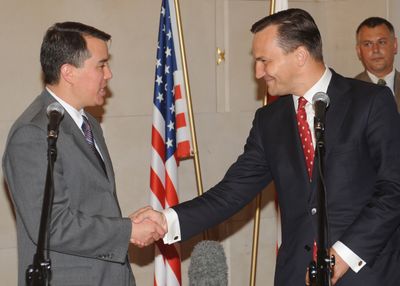U.S., Poland agree on missile deal
Plan angers Russia, sparks fears of new arms race

WARSAW, Poland – Poland and the United States struck a deal Thursday that will strengthen military ties and put an American missile interceptor base in Poland, a plan that has infuriated Moscow and sparked fears in Europe of a new arms race.
“We have crossed the Rubicon,” Polish Prime Minister Donald Tusk said, referring to U.S. consent to Poland’s demands after more than 18 months of negotiations.
Washington says the planned system, which is not yet operational, is needed to protect the U.S. and Europe from possible attacks by missile-armed “rogue states” like Iran. The Kremlin, however, feels it is aimed at Russia’s missile force and warns it will worsen tensions.
U.S. officials said the timing of the deal was not meant to antagonize Russian leaders at a time when relations already are strained over the recent fighting between Russia and Georgia over the South Ossetia region.
In an interview on news channel TVN24, Tusk said the United States agreed to help augment Poland’s defenses with Patriot missiles in exchange for placing 10 missile defense interceptors in the eastern European country.
He said the deal also includes a “mutual commitment” between the two nations to come to each other’s assistance “in case of trouble.”
That clause appeared to be a direct reference to Russia, which has threatened to aim its nuclear-armed missiles at Poland – a former Soviet satellite – if it hosts the U.S. site.
Poland has all along been guided by fears of a newly resurgent Russia, an anxiety that has intensified with Russia’s offensive in Georgia, a former Soviet republic. The incursion, along with the bombing of military posts and airfields inside Georgia, has underlined a palpable fear in the region of Russia’s renewed vigor and confidence.
In past days, Polish leaders said the war justified Poland’s demands that it get additional security guarantees from Washington in exchange for allowing the anti-missile base on its soil.
Talking about the “mutual commitment” part of the agreement, Tusk said that the North Atlantic Treaty Organization would be too slow in coming to Poland’s defense if threatened and that the bloc would take “days, weeks to start that machinery.”
Tusk said that armed with Patriot missiles, Poles “will be able to effectively protect our territory.”
But after the deal was announced, both American and Polish officials sought to play down any connection to the Georgian war.
“This is not linked to the situation in Georgia,” the chief U.S. negotiator, John Rood, told the Associated Press, after the pact was initialed. “We had made these arrangements for this round of negotiations before the conflict in Georgia, and so we just merely continued with the schedule we had.”
In initial reaction from Russia, the parliamentary foreign affairs committee chairman, Konstantin Kosachev, was quoted by Interfax news agency as saying the agreement will spark “a real rise in tensions in Russian-American relations.” He repeated the view that defense shield really targets Russia’s arsenal.